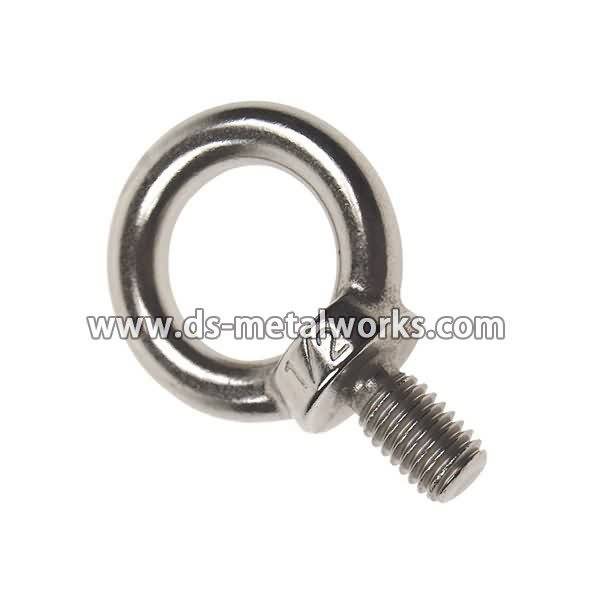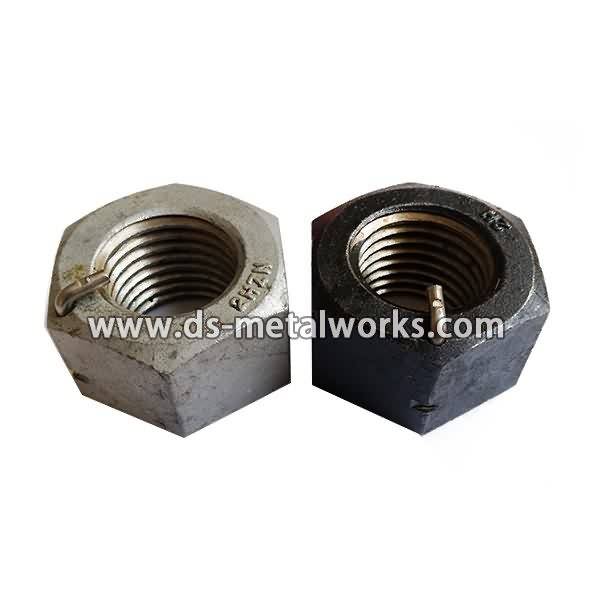High quality factory DIN580 ASME B18.15 Lifting Forged Eye Bolts Wholesale to Indonesia

Short Description:
Lifting Forged Eye Bolts Eye Bolt Steel Hooks Bolts Standard: DIN580, ANSI/ASME B18.15 Metric Size: M6-M80 with various lengths Inch Size: 1/4-3” with various lengths Material Grade: ISO 898-1 class 4.8, 5.8, 6.8, 8.8, 10.9, 12.9, ISO 3056-1 A2-70, A4-70 SAE J429 2, 5, 8; ASTM A193/A320 B7, B8, L7; ASTM A489 Finish: Black Oxide, Zinc Plated, Hot Dip Galvanized, Dacromet, and so on Packing: Bulk about 25 kgs each carton, 36 cartons each pallet Advantage: High Quality and Strict Quality Control...
Product Detail
Product Tags
High quality factory DIN580 ASME B18.15 Lifting Forged Eye Bolts Wholesale to Indonesia Detail:
Lifting Forged Eye Bolts Eye Bolt Steel Hooks Bolts
Standard: DIN580, ANSI/ASME B18.15
Metric Size: M6-M80 with various lengths
Inch Size: 1/4-3” with various lengths
Material Grade: ISO 898-1 class 4.8, 5.8, 6.8, 8.8, 10.9, 12.9, ISO 3056-1 A2-70, A4-70
SAE J429 2, 5, 8; ASTM A193/A320 B7, B8, L7; ASTM A489
Finish: Black Oxide, Zinc Plated, Hot Dip Galvanized, Dacromet, and so on
Packing: Bulk about 25 kgs each carton, 36 cartons each pallet
Advantage: High Quality and Strict Quality Control, Competitive price,Timely delivery; Technical support, Supply Test Reports
Please feel free to contact us for more details.
Product detail pictures:


With our leading technology at the same time as our spirit of innovation,mutual cooperation, benefits and development, we are going to build a prosperous future alongside one another with your esteemed enterprise for High quality factory DIN580 ASME B18.15 Lifting Forged Eye Bolts Wholesale to Indonesia, The product will supply to all over the world, such as: Algeria, Haiti, Qatar, You can always find the solutions you have to have in our company! Welcome to inquire us about our product and anything we know and we can help in auto spare parts. We have been looking forward to work with you for a win-win situation.
Heat Bluing A Set Of Steel Clock Hands, by Clickspring.
In this video I go through the process of bluing a set of steel clock hands.
Heat bluing of small steel parts is a key element of traditional clock and watchmaking. It can transform the appearance of even the most mundane parts, and is also believed to afford the parts a small measure of corrosion resistance.
The rest of the process for making the hands and motion work of the current clock project can be found here: https://TBA
If you would like to help support the creation of these videos, then head on over to the Clickspring Patreon page: https://www.patreon.com/clickspring
________________________________________________________
A very special thank you to patrons Dan Keen, and Rob Shearing.
________________________________________________________
Ask Me A Question:
https://www.clickspringprojects.com/contact.html
Follow Clickspring:
https://www.patreon.com/clickspring
https://www.facebook.com/Clickspring1
https://plus.google.com/u/0/113668471124073837794/posts
https://instagram.com/clickspring1/
https://www.tumblr.com/blog/clickspring1
https://www.pinterest.com/clickspring1
Abbreviated Transcript:
00:17 Generally its presented as 4 steps – Harden the part, Heat temper it to Blue, Polish the surfaces, and then Heat again for a cosmetic blue. But first things first, what is it about heating steel that makes it turn blue?
00:50 When full spectrum light strikes the surface, some is directly reflected by that oxide, and some passes through and is reflected by the underlying metal, and so travels a tiny bit further. The two waveforms are now slightly out of phase, and interact as they leave the upper surface.
01:06 Depending on the thickness of the film, some colors are cancelled, and what we see are those colors that remain. When the film is thin, we see a pale straw color. As the film gets thicker other colors are removed, and color we see gradually shifts from brown through purple to a rich blue.
01:24 This is known as thin film interference; its what causes the rainbow of colors in soap bubbles, and a very similar effect generates those fantastic iridescent colors you can see on some birds and insects.
01:37 In our case if we get everything right, the result is a magical deep blue color on our steel part, that no other process can quite match. And I should also mention that the result is not just a pretty blue color, but also a very reliable proxy for determining temperature, which we use during the tempering process in a moment.
01:55 So with a bit of the science behind the process in hand, we can make a few statements about what factors will affect the quality of the final blue color we’re pursuing. For one thing it seems reasonable to expect that a uniform oxide thickness would give a uniform color, so it follows that we’ll want to heat the part as uniformly as we can. I’ve made a dedicated set of bluing tools.
02:31 Any sort of contamination will not only affect
the way the oxide forms, but also the light reflection, so we want the work to be meticulously clean just before we start heating. Hardened steel will take a mirror polish much more readily than a soft steel. So the first step is to harden the work.
03:52 Once finished, that boric acid coating comes off very easily with a little boiling water. Now at the moment, the parts are glass hard, and much too fragile to be safely handled without risking breaking them, so I need to temper that hardness.
04:43 As it happens the temperature we want to temper
the work to, corresponds to the blue oxide color, a little over 300 degrees celcius, which is why you see the steel blued twice – once is for this tempering, and the second time at the very end, is just for the appearance. And you can see with this hour hand, just how sensitive the bluing process is to a temperature differential.
06:38 The final surface finish comes from using diamantine powder on a tin lap. Again with short moves to maintain the flat surfaces.
07:51 It pulls the last of the solvent residue from the surface, and leaves the parts quite clean. And you’ll notice that I don’t touch the parts with bare hands from here on, until the bluing is finished, to maintain that clean surface.
08:40 If the color has any sort of flaw, like for example you can see that the very tip of this hour hand doesn’t quite go fully blue, then the part must be taken back to the previous polishing stage.
09:11 There are also several other factors that can affect the outcome too, beyond what I’ve mentioned here, including the composition of the steel, the ambient conditions, as well as the nature of the light being used to illuminating the part. All of this can be experimented with to further improve the final result.
References:
Hardening, Tempering and Heat Treatment (Workshop Practice)
https://www.amazon.com/Hardening-Tempering-Treatment-Workshop-Practice/dp/0852428375
Heat Bluing A Set Of Steel Clock Hands, by Clickspring.
Boston 6-String Banjo
Tuned like a Guitar, Guitar players can get up and go with this 6-string banjo – Uniquely Deering, the Boston Banjo breaks with tradition and provides a professional quality sound at a lower price point by creating the rim from 3/16″ rolled steel which rings like a tone ring. Also, upgrading the accuracy of tuning by way of guitar tuners with a higher gear ratio than the traditional banjo tuners.. The uniquely Deering Inlay pattern gives you visual beauty enhancing the great performance. This banjo is the preferred sound in country recording studios and in non-traditional bands like the Keith Urban Band. You can hear this banjo played on Keith Urban songs like “Someone Like You” and his Grammy award winning “Sweet Thing.”
It has big resonant bass notes that you don’t find on a 5-string banjo, and also crisp highs for that beautiful banjo tone.
Neck Wood Mahogany
Finish Satin
Number of Strings 6
Type of Banjo 6-String
Tone Ring Steel Rim
Neck:
Tropical American Mahogany
Slender Deering Neck Shape
Arched Ebony Fingerboard
Seed & Vine Inlays,
Guitar Style Tuners
Adjustable truss-rod
22 Pressed In Nickel-Silver Frets
Pot:
3/16″ Durable Nickel Plated Steel Rim
24-Piece Butterfly Flange
24 flat hooks with 9/32″ hex nuts
24 Bracket Shoes
11″ Frosted Top High Crown Head
Beveled Tension Hoop
Deering 6-string Tailpiece
Nickel Plated Hardware,
Deering 6-String Tailpiece
Resonator:
Mahogany, with white binding
Trimmed in White
Straight Side Walls
Satin Finish
Tone:
Has the sweet sound of mahogany with less sustain for clear notes. Crisp highs and good bass response with less overtones than many banjos. Easy to play with clarity of note separation. Great for recording.
Tuned E,A,D,G,B,E for standard Guitar tuning, can also be tuned in other tunings
To get the best
banjo tone it should have light or extra light guitar strings or electric guitar strings.
Includes a Deering Hardshell Case
Dimensions:
Neck Width at the Nut 1 ¾”
Scale Length Nut to Bridge 26 ¼”
Resonator diameter 13 7/8″
Overall Instrument Length 38 ½”
The Deering professional series offers an inspiring collection of professional grade banjos which, when played, will leave the player longing for more. Built in our California facility by the same team who make the Goodtime Series and the Private Collection models, these high quality American made instruments are built to be played and will stand up to any live or studio performance. Professional Collection models come packed with features including beautiful intricate inlay work, more choices of wood, ebony fingerboard, gloss finish on select models, a hard-shell case and a lifetime warranty. All you have to do is try one. You wont need anything else.






